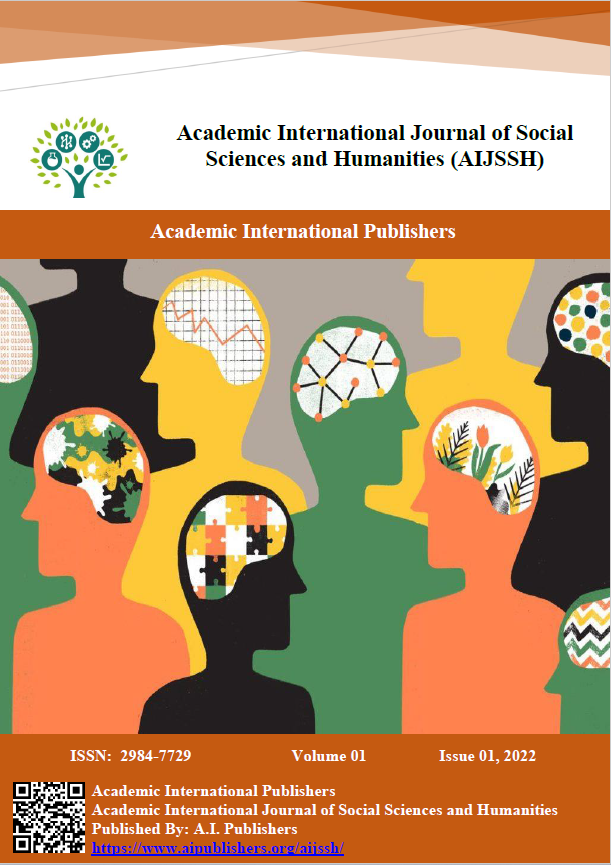The Effect of African Languages and Dialects on Classical Arabic
DOI:
https://doi.org/10.59675/S114Sالكلمات المفتاحية:
languages, dialects, sounds, Afrikaans, Chad.الملخص
In our time, we notice a great deal of error and melody among people, including teachers, educated people, and the general public. This portends a grave danger affecting the Arabic language, which Almighty Allah glorified by making the language of the Qur’an in it. We do not forget that one of the most important reasons for the emergence of Arabic grammar is the spread of error and melody among people for various reasons (religious, social, and national). If this was in the past, how can we be in the present, when the ages have changed, the dispersals have increased, and the nations have overlapped? Unfortunately, people are relatively less interested in Arabic, especially those without specialization. It was necessary for us to try as much as possible to limit these errors of their different types. Thus, this study came to cover even the slightest thing in this section by presenting the history of linguistic melody and some models of melody that a small study will not be able to enumerate and then highlight the solutions to this dangerous phenomenon. The study consisted of an introduction and three chapters. In the introduction, we discuss the importance of the topic. The first topic: In it we learn about the nature of linguistic melody and its origins and the attempts of scholars to treat it throughout the ages, and what are the reasons that led to its appearance. The second topic will be the heart of the research topic. In it, we learn about models of linguistic, grammatical, morphological, spelling, and semantic melody. We arrive at the third topic, in which we refer to the most important methods and attempts to reduce this phenomenon, then we reach a complete one, and then we conclude the research with a conclusion and a list of sources and references.
المراجع
- ابن منظور، لسان العرب، دار صادر، بيروت _ لبنان ، 2008 .
- اسامه الجوهرى ، الفن الافريقي ، هلا للنشر والتوزيع ، القاهرة ، 2005 .
- علوى عبد الرحمن النجار، الشعر الزنجي _ معالم وسمات، القاهرة،2022 .
- عبد الرحمن زكي ، المسلمون والإسلام في غرب افريقيا ، مطبعة يوسف ، القاهرة ، 1965م .
- إبراهيم طرخان، إمبراطورية برنو الإسلامية ، الهيئة المصرية العامة للكتاب ، القاهرة ، 1975م .
- فضل كلود الدكو ، الثقافة الإسلامية في تشاد في العصر الذهبي لإمبراطورية كانم ، منشورات كلية الدعوة الإسلامية ، ليبيا ، 1988م.
- إبراهيم صالح ، تاريخ الإسلام وحياة العرب قي امبراطورية كانم برنو ، مطبعة مصطفى البابي ، مصر،1960 .
- سعيد عبد الرحمن أحمد الجنديري ، تطور الحياة السياسية في تشاد منذ الاحتلال حتى نهاية حكم تومبلباي 1912 _ 1960م ، دار الكتب الوطنية ، بنغازي ، 1988 .
- إبراهيم أنيس وآخرون ، المعجم الوسيط ، دار المعارف للطباعة ، مصر ، ج2 ، 1973 .
- صالحة راشد غنيم ، اللهجات في كتاب سيبويه أصواتا وبنية دار المدني للطباعة والنشر والتوزيع ، ط1 ، جدة ، 1994م .
- عبد الله محمد آدم ، الأصوات ورموزها في (بزا _ مبا) لغة الوداي (البرقو) ، جامعة الامام محمد بن سعود ، الرياض ، مؤسسة الرسالة، بيروت ، 1994م .
- فضل كلود الدكو ، الثقافة الإسلامية في تشاد في العصر الذهبي لإمبراطورية كانم، 1960.
- حسن أحمد محمود، الإسلام والثقافة العربية في افريقيا ، مصر ، 1931 .
- جرجي زيدان ، الفلسفة اللغوية ، دار الهلال ، القاهرة ،1970.
- Atlas pratique du Tchad: sous la direction assisté de Jean CABOT, assisté de Chirstian BOUQUET. Présentation de Sean DRESH, 1966 Paris, p. 36.
التنزيلات
منشور
إصدار
القسم
الرخصة
الحقوق الفكرية (c) 2023 Academic International Journal of Social Sciences and Humanities

هذا العمل مرخص بموجب Creative Commons Attribution 4.0 International License.

